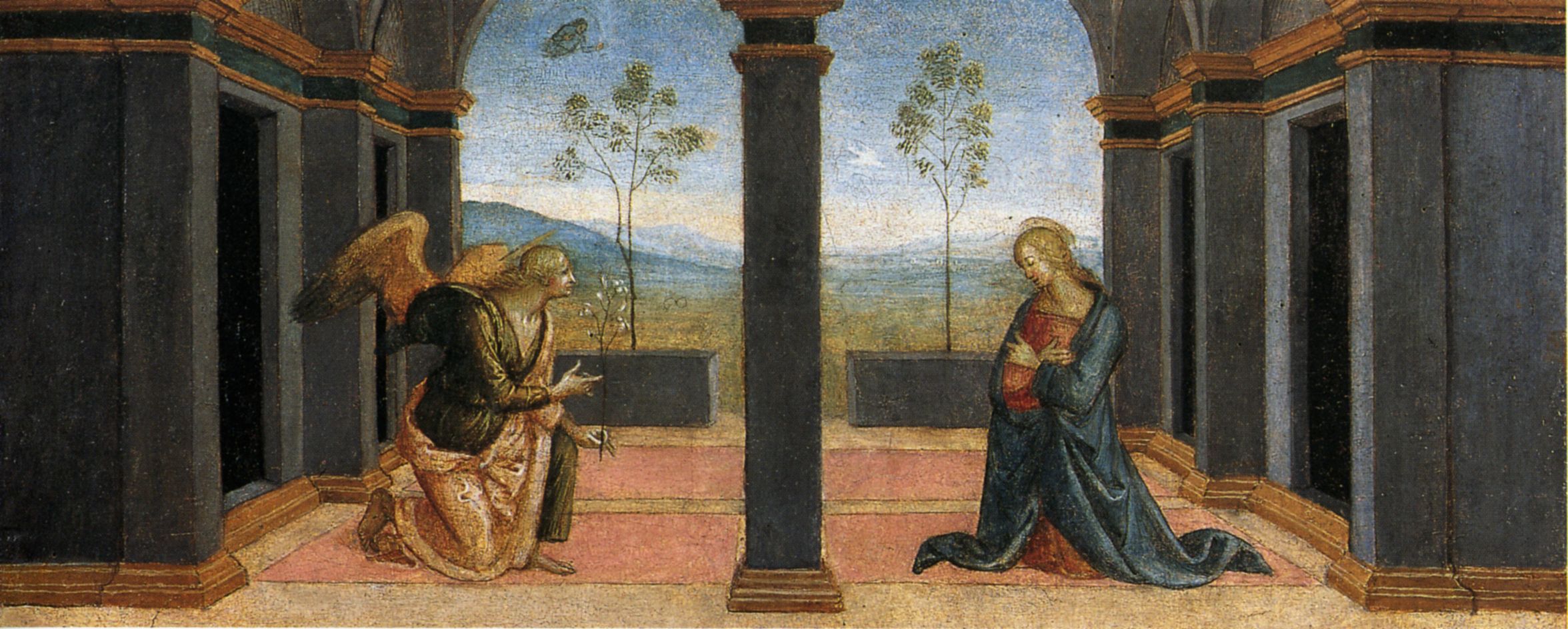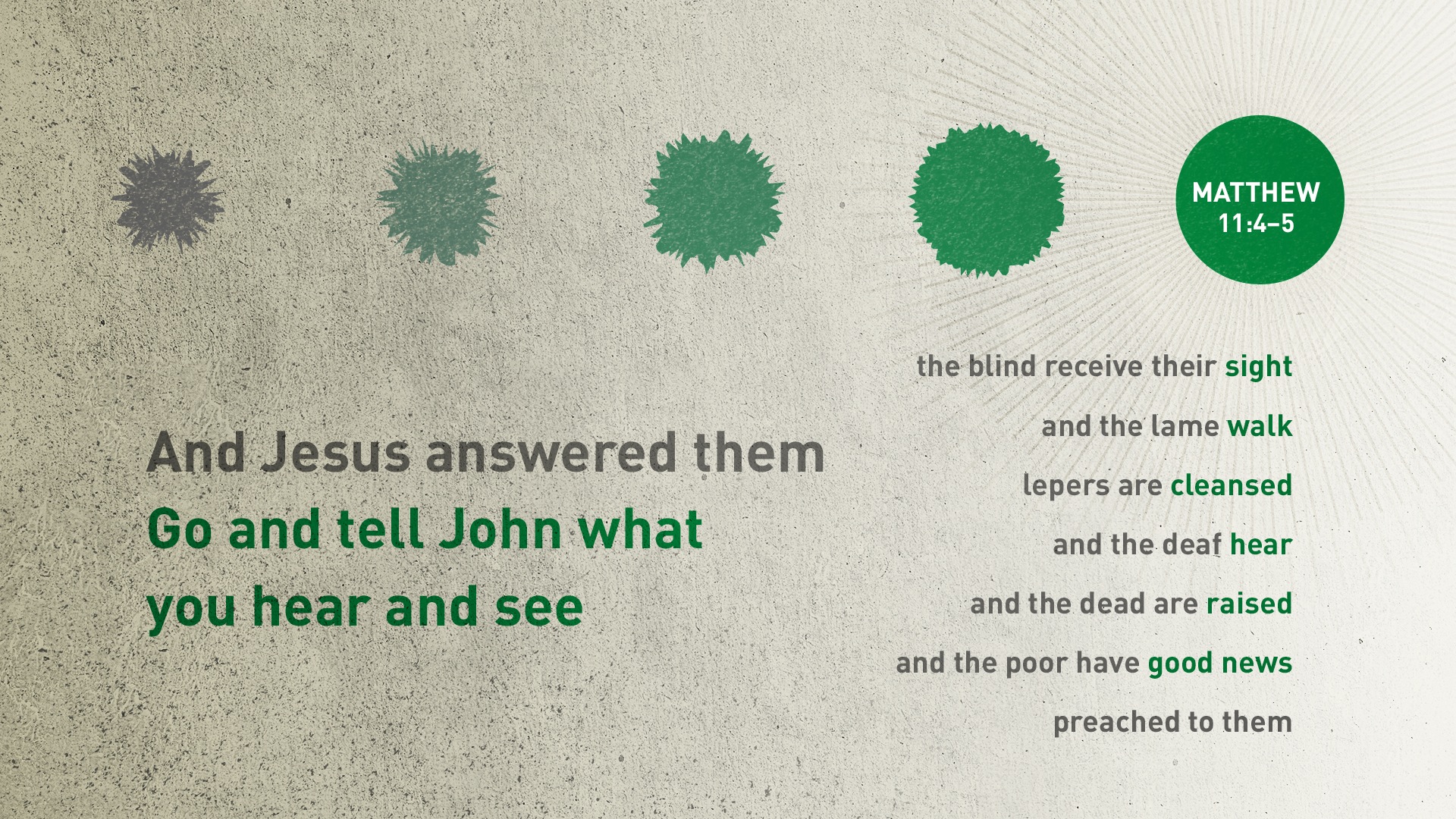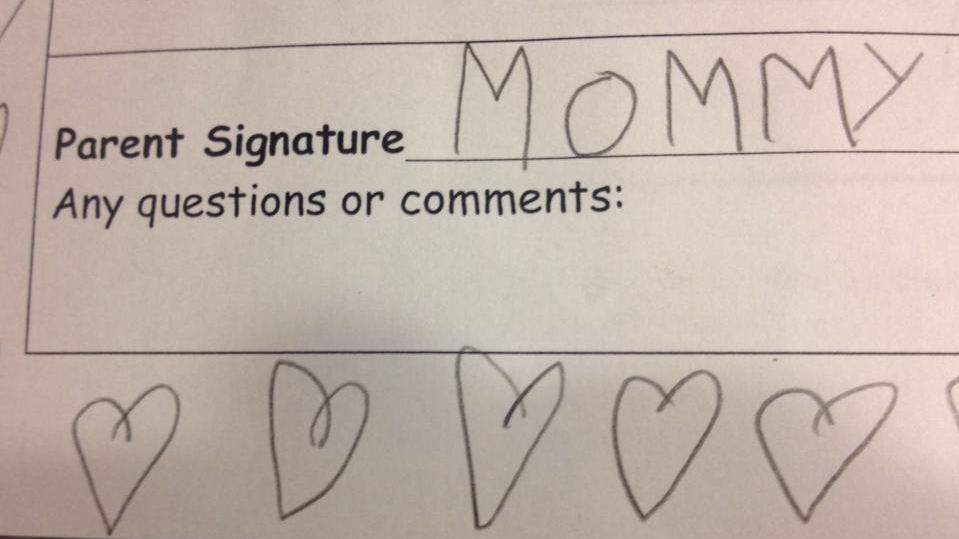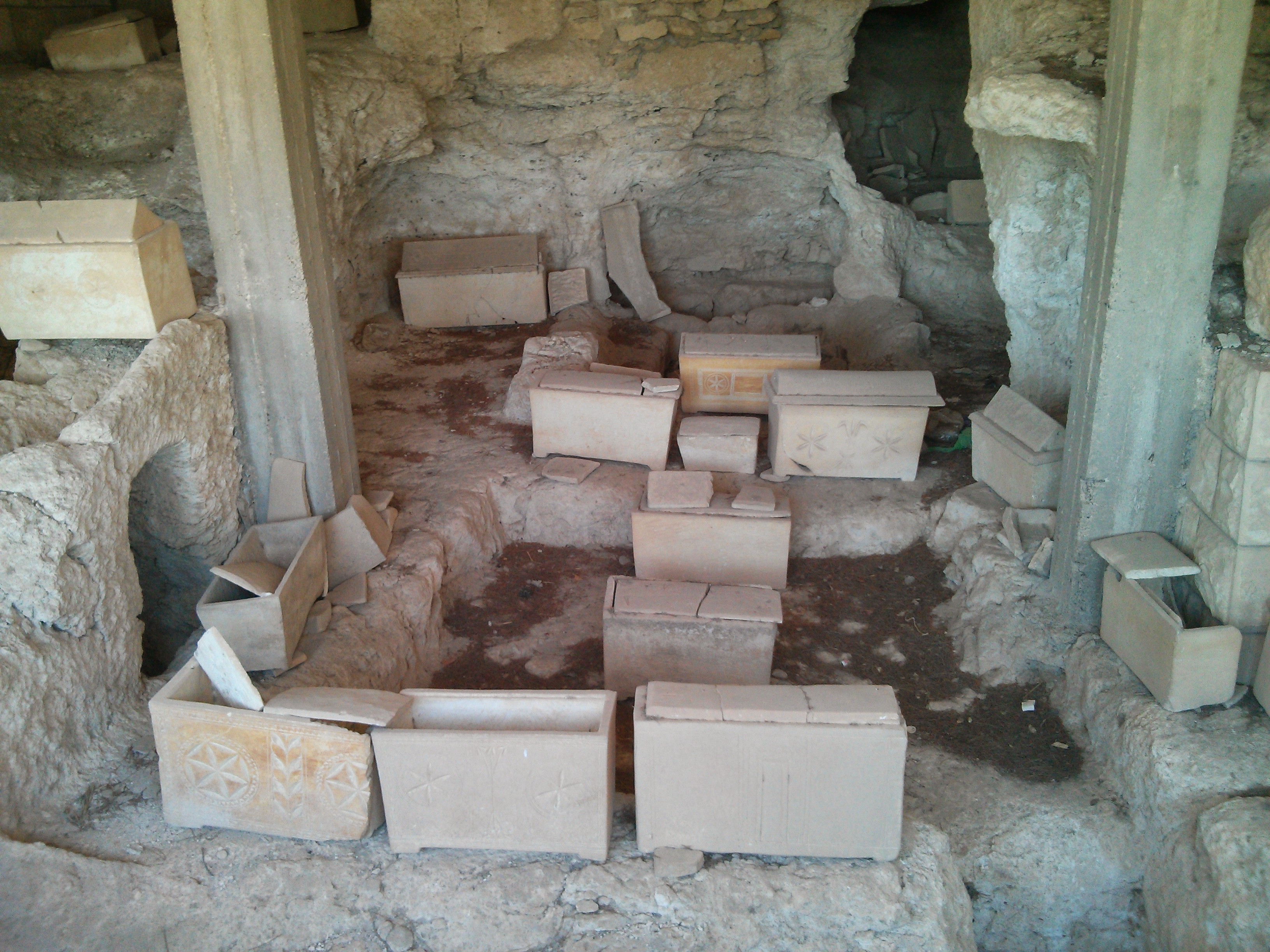In today’s Gospel, Jesus is accused of being a mere man trying to “make himself God”. His opponents got it backwards: Man didn’t become God, but God, in Jesus, became man. That’s another story entirely.
Posts

Today’s Gospel on this Solemnity of the Annunciation is the famous account of Mary’s encounter with Gabriel from Luke 1:26-38. It includes some indirect proof for two major Marian dogmas of the Church – the Immaculate Conception (which was recently celebrated on Dec. 8), and the perpetual virginity of Our Lady. It also gives us part of the biblical roots of the “Hail Mary”.
When the archangel Gabriel greets Mary, it marks the only recorded incident in scripture that an angel greets someone by their title, not their name. “Hail, Full of Grace, the Lord is with you” (Lk 1:28). This, of course, is the first line of the “Hail Mary”, with the second line, “Blessed are you among women, and blessed is the fruit of your womb”, from Luke 1:42. So much for the ridiculous argument that the prayer is “unbiblical”.
But what of those dogmas? Speaking of the phrase, “Full of Grace”, in the original Greek of Luke’s Gospel, it is an interesting term: kecharitomene. It means, literally, “one who has been made full of God’s grace” (biblical translations that render this term “highly favored one”, or something to that effect, don’t cut it) . It’s a past perfect term, meaning that, at some point in the past, Mary was made perfectly full of God’s grace. This condition extends out into the future, into eternity. This is exactly what the Immaculate Conception is all about – that, from the first moment of her existence, Mary was preserved free from all stain of original sin. If one is perfectly full of the grace of God, there is no room for sin.
With respect to the perpetual virginity, Gabriel explains to Mary that she will bear the Messiah, and at this point he has said nothing about Jesus being conceived by the Holy Spirit. Yet, Mary says, “How can this be, since I am a virgin?” (Lk 1:34). A very strange question for a young woman to ask, who, as we have already been told, was engaged to be married. Unless, that is, she had already intended to remain a virgin, consecrating herself wholly to God.
This post was originally published as “Mary of the Annunciation”.

In this Sunday’s Gospel reading (Matt 11:2-11), John the Baptist, who by this time has been imprisoned by Herod, sends messengers to ask Jesus if he is the promised Messiah. Have you ever wondered why John did that? Have you ever wondered why Jesus doesn’t simply answer, “Yes”? Read on!
Indeed, Jesus’ reply to the imprisoned John the Baptist (Matt 11:2–6; cf. Luke 7:18–23) is seen by some commentators as not Messianic. Some have even gone so far as to suggest that Jesus never personally believed he was the Messiah. When asked “Are you he who is to come, or shall we look for another?” (Matt 11:3), Jesus answers in what appears to be a vague manner, using words from Isaiah 61: “Go and tell John what you hear and see: the blind receive their sight and the lame walk, lepers are cleansed and the deaf hear, and the dead are raised up, and the poor have good news preached to them. And blessed is he who takes no offense at me” (Matt 11:4-6).
A very important clue as to why Jesus answered the way he did was discovered in the Dead Sea Scrolls. The Scrolls were written roughly around the time of the Advent of Jesus Christ – between the last three centuries BC and the first century AD. Although they were composed by a sectarian, apocalyptic Jewish sect, they do shed light on what Jews who were roughly contemporaneous to Jesus believed about the coming Messiah.
One of the most important Scrolls that was discovered, known as 4Q521, says this:
For the heavens and the earth will listen to his Messiah…For he will honour the devout upon the throne of eternal royalty, freeing prisoners, giving sight to the blind, straightening out the twisted…and the Lord will perform marvellous acts…for he will heal the badly wounded and will make the dead live, he will proclaim good news to the meek, give lavishly to the needy, lead the exiled, and enrich the hungry.
One can easily see by comparing these two texts why it was that John asked the question about Jesus’ Messiahship, and why Jesus replied the way he did. It was assumed that when the Messiah arrived, according to 4Q521, “prisoners would be set free”. The righteous John, at this time languishing in Herod’s prison fortress at Machaerus, is wondering why Jesus hasn’t sprung him in a “prison break” of sorts. Jesus replies to John by noting that his marvellous works indeed match up with the deeds of the expected Messiah, in line with the teaching of Isaiah 61 and 4Q521. For Jesus to be any more explicit than this would arouse the attention of the secular authorities, prior to the completion of his Messianic mission. However, attentive Jews would have understood Jesus’ claims. Thus, in a culturally relevant manner, Jesus is inviting his fellow Hebrews to consider the evidence of his ministry and draw their own conclusions.

This Sunday is the Church’s “New Year’s Day”, as it were. It’s not only the first Sunday of Advent, but also the beginning of a new liturgical year in the Church. It’s a great time to start over, start fresh, and try to live our faith better. So, as we make our Catholic “New Year’s resolutions” about how to live Advent well, we need to keep some important points in mind:
The first thing we need to remember is that the season of Advent is not the season of Christmas! This is very difficult for us to do, because our culture has completely forgotten this truth. The culture at large wants to either A) eliminate all religious references to the season at all – for example, calling it simply the “Holiday Season”, or B) celebrating Christmas prematurely, within the season of Advent.
In the first case (A), cultural relativism – with a particularly virulent hatred for Christianity – seeks to eliminate all references to the divine at this time of year. But we really can’t escape the truth. Even the word “holiday” actually means “holy day”.
However, for Catholics, the second problem (B) is much more of a temptation. It has become quite common for people to “pull back” the feast of Christmas into Advent. The Church teaches us that Advent is actually (much like Lent) a season of penitential preparation for the great Feast of Christmas. This is one reason why many dioceses have an annual “Advent Confessions Day”, just as in Lent. This is also why Mass readings during Advent focus on the Second Coming of Christ and the Great Judgment – we need to put our lives in order and be ready to meet the great King.
The Church even encourages fasting during Advent. Without a fast, there can be no feast at Christmas. Other penances, like prayer and giving to the needy, get us spiritually ready for Christmas (cf. CCC 1434).
In stark contrast, cultural practices like office Christmas parties and other festive gatherings prior to Christmas encourage sumptuous feasting – and tragically, in so many cases, dissolute and downright dreadful debauchery. One should take to heart the words of Saint Paul from this Sunday’s second reading:
Brothers and sisters: You know the time; it is the hour now for you to awake from sleep. For our salvation is nearer now than when we first believed; the night is advanced, the day is at hand. Let us then throw off the works of darkness and put on the armor of light;
let us conduct ourselves properly as in the day, not in orgies and drunkenness, not in promiscuity and lust, not in rivalry and jealousy. But put on the Lord Jesus Christ, and make no provision for the desires of the sinful nature (Romans 13:11-14).
Prayer, penance, and preparation. That’s the recipe for living Advent well. The great Feast of Christmas will be all the sweeter for us as a result.

In this Sunday’s Second Reading (33rd Sunday in Ordinary Time), we heard Saint Paul address the Thessalonians:
Brothers and sisters:
You know how one must imitate us.
For we did not act in a disorderly way among you,
nor did we eat food received free from anyone.
On the contrary, in toil and drudgery, night and day
we worked, so as not to burden any of you.
Not that we do not have the right.
Rather, we wanted to present ourselves as a model for you,
so that you might imitate us.
In fact, when we were with you,
we instructed you that if anyone was unwilling to work,
neither should that one eat.
We hear that some are conducting themselves among you in a
disorderly way,
by not keeping busy but minding the business of others.
Such people we instruct and urge in the Lord Jesus Christ to work quietly
and to eat their own food.
– 2 Thessalonians 3:7-12
Saint Paul is extremely forceful and commanding in his instructions to the Thessalonians here – and, by extension, to us. He speaks to both wrongdoers and the congregation as a whole with power: “We command and exhort you…in the name of our Lord Jesus Christ”. This is the strongest language Paul could have used. And what does Paul command? That certain people in the congregation stop being “disorderly” (which is sometimes translated as “idle”).
It’s not necessarily the case that these people were idle in the sense of being inert or slothful – “couch potatoes”, as it were. In fact, it appears they were quite “busy” in their own way – but not in a good way. They were being what Paul calls “busybodies”. That is, they were spending a lot of time and effort “meddling in the affairs of others” – literally, “minding other people’s business”. The so-called “work” that they were doing was not at all productive or helpful for the community. Rather, it was downright disorderly and harmful.
One is reminded of a maxim from Saint Josemaria Escriva:
You are untiring in your activity. But you fail to put order into it, so you do not have as much effect as you should. It reminds me of something I heard once from a very authoritative source. I happened to praise a subordinate in front of his superior. I said, “How hard he works!” “You ought to say”, I was told, “ ‘How much he rushes around!’”
You are untiring in your activity, but it is all fruitless…How much you rush around!
– Furrow, 506
Mere “busyness” can actually be a hidden form of laziness and love of comfort, not to mention disorderliness. Sure, a person can be running around, doing a whole bunch of “stuff” – but they are not the things the person ought to be doing.
There is also the very real temptation of being a “busybody” in another sense – that of being a gossip. This has always been a temptation whenever and wherever people live together, but it is a constant temptation in parish life – for both clergy and laity. As disciples of Jesus Christ, we simply must stop speaking about others behind their backs.
Saint Paul set the Church a powerful example in this regard, by doing hard, constructive, and productive work (in his case, as a tentmaker). He provided for his own needs, and even those of others, so that he was not dependent on anyone else (cf. 1 Thess. 4:11-12). Although, as an apostle, Paul could have received his living from the congregation, he chose not to. He did this so that he could provide a model for how his disciples should live in the world as Christians.
Saint Paul shows that work well done for God’s glory in any honest profession is the “hinge” of our sanctification in the world. We can sanctify our work, we can sanctify ourselves through our work, and we can also sanctify others through our work.

“Sunday Scriptures” is a series of posts explaining the Sunday Mass readings – helpful for those preparing to worship, or preparing a homily!
In this Sunday’s Second Reading we hear:
We ask you, brothers and sisters, with regard to the coming of our Lord Jesus Christ
and our assembling with him, not to be shaken out of your minds suddenly, or to be alarmed either by a “spirit,” or by an oral statement, or by a letter allegedly from us to the effect that the day of the Lord is at hand.
– 2 Thessalonians 2:1-2
Paul wrote this because some people in the first-century Thessalonian church were absolutely obsessed with the Second Coming of Jesus – so much so that they had even quit their jobs! They expected Jesus’ imminent return to earth, with the final judgment to ensue (this is what “the day of the Lord” means in the Bible).
This had the effect of greatly upsetting other members of the congregation, who were, as Paul writes, both “shaken” and “alarmed”. To top it all off, the false teachers were claiming they were inspired by a “spirit” about these things. Some even claimed that Paul himself had taught this – hence the reference to an alleged “statement” from Paul. They even went so far as to forge a letter from Paul to this effect!
Paul goes on in the letter to set things straight about what must occur before the Second Coming. First, the mysterious “man of lawlessness” must be revealed – a figure identified with the Antichrist (2 Thess 2:3-12; for much more on this see CCC 668-79).
Paul also teaches believers how to live in the meantime. Specifically, they should heed Paul’s advice in his earlier letter to them (known as 1 Thessalonians). He warns them to stop being freeloaders, spending all their time gossiping, and tells them to get to work (see 2 Thess 3:6-14). Paul himself had set them a great example while he was with them. Rather than accepting money from the congregation for his apostolic endeavours (though he had every right to), he diligently worked “night and day” at his outside job (tentmaking) to provide for his own needs and those of others (2 Thess 3:8). In so doing Paul gives witness that one of the best ways to prepare for the afterlife is not to idly speculate about it, but to work diligently and live virtuously in this world.

“Sunday Scriptures” is a series of posts explaining the Sunday Mass readings – helpful for those preparing to worship, or preparing a homily!
In this Sunday’s Gospel reading, we hear Jesus’ famous parable about the Pharisee and the tax collector:
Jesus addressed this parable to those who were convinced of their own righteousness and despised everyone else. “Two people went up to the temple area to pray; one was a Pharisee and the other was a tax collector. The Pharisee took up his position and spoke this prayer to himself, ‘O God, I thank you that I am not like the rest of humanity — greedy, dishonest, adulterous — or even like this tax collector. I fast twice a week, and I pay tithes on my whole income.’ But the tax collector stood off at a distance and would not even raise his eyes to heaven, but beat his breast and prayed, ‘O God, be merciful to me a sinner.’ I tell you, the latter went home justified, not the former; for whoever exalts himself will be humbled, and the one who humbles himself will be exalted.”
– Luke 18:9-14
The mistake of the Pharisee is not found in his avoidance of sin or in his religious observances, like fasting and tithing. In fact, this is all quite laudatory. His real problem lies in his exalted view of himself. He does not discern his own sinfulness or need of God’s forgiveness. The tax collector, on the other hand, does realize that he is a sinner who stands in need of God’s forgiveness – and moreover, that he does not deserve that mercy.
The Pharisee does not realize that, far from being acceptable to God, he is actually an idolater! What the Pharisee is doing, ultimately, is arrogating one of God’s prerogatives unto himself (this is in fact what the devil does, as scholar Charles Talbert points out) – in this case, the prerogative of judgment. The Pharisee, who says, in essence – “I am not a thief” – is actually stealing something from God.
Now, while it is true that we must judge objective actions as being sinful or not, one can never judge a person’s intentions (what their motives may have been) or ultimate destiny (whether they will end up in either Heaven or Hell) before God.
What the Pharisee did not realize was that the tax collector not only a) knew he was a sinner; but b) had already inwardly repented and asked for God’s mercy. Ironically, the hated tax collector, despised by the Pharisee, is accepted by God. The Pharisee, conversely, demonstrates an attitude that God despises. The self-congratulating Pharisee was not aware of his own sin and thus didn’t feel the need to repent. Not having asked God for forgiveness, he therefore wasn’t forgiven! It was actually the tax collector who “went home justified before God”.
Christians should take note of Jesus’ words by practicing personal humility before God and others, and avoiding haughtiness.

In today’s Gospel reading at Mass we hear about three would-be followers of Jesus:
As Jesus and his disciples were proceeding on their journey, someone said to him, “I will follow you wherever you go.” Jesus answered him, “Foxes have dens and birds of the sky have nests, but the Son of Man has nowhere to rest his head.” And to another he said, “Follow me.” But he replied, “Lord, let me go first and bury my father.” But he answered him, “Let the dead bury their dead. But you, go and proclaim the Kingdom of God.” And another said, “I will follow you, Lord, but first let me say farewell to my family at home.” Jesus answered him, “No one who sets a hand to the plow and looks to what was left behind is fit for the Kingdom of God.”
– Luke 9:57-62
What troubles many readers is that Jesus seems especially harsh towards the second man, whose father has passed away. Of course, we know that elsewhere, Jesus stressed the importance of a “God-first” lifestyle – that God must come before family. “Whoever loves father and mother…son or daughter more than me is not worthy of me” (Matt 10:37). Jesus is not implying that we should not love family – of course we should! But we must love God above all. In fact, only by using this “top-down” approach can we love people as they should be loved in God. Thomas More, a great family man and martyr, knew this full well.
But Jesus appears to many people to be going completely over-the-top in today’s Gospel. Most people read this passage as understating the extreme urgency of following Jesus, no matter what is going on in one’s life. when Jesus calls, you jump up. You follow. But, is Jesus seriously implying that this man should not care for his father in his final hours, and be present for his proper burial? Is Jesus being cruel here?
In a word: no! Far from it. You see, in all likelihood, the man’s father was already dead, and had been for quite some time. The Jews in Jesus’ time practiced what is known as secondary burial. After the deceased had been buried, one year later the family would return to the tomb and collect the bones (the flesh had decomposed by this point). The bones would then be placed in what is known as an ossuary (literally, a “bone-box”) and placed in a niche in the family tomb.
At the time Jesus called this man to be a disciple, he was probably making preparations for the re-interment of his father’s remains – a task that, while important, could have been undertaken by others. If the man’s father had still been on his deathbed, no doubt Jesus would have wanted him to be cared for. But, given that he was already dead, and given who Jesus is – and the criticality of his mission – it is a lot more understandable in this instance why Jesus would call him.
What do you think? Has this passage ever confused you? Share this post on Facebook, Twitter, or LinkedIn and discuss!

Today’s first reading is selected from Acts 17, which chronicles St Paul’s visit to Athens. Paul’s brilliant, culturally relevant preaching of the Gospel in the Areopagus didn’t convert everyone, outstanding though it was (the illustration of the “unknown God” was inspired – quite literally!).
This should encourage all who proclaim the Word (many people didn’t listen to Jesus himself, either). We do see, though, in the responses to Paul’s message, three common responses that all who proclaim the Gospel encounter:
God has overlooked the times of ignorance,
but now he demands that all people everywhere repent
because he has established a day on which he will ‘judge the world
with justice’ through a man he has appointed,
and he has provided confirmation for all
by raising him from the dead.”
When they heard about resurrection of the dead,
some began to scoff, but others said,
“We should like to hear you on this some other time.”
And so Paul left them.
But some did join him, and became believers.
Among them were Dionysius,
a member of the Court of the Areopagus,
a woman named Damaris, and others with them.
-Acts 17:30-34
Some scoffed. Some said, “Let’s hear more about this later”. But some believed. And so it goes, even today.
Which camp are you in?

Q. This Sunday’s Gospel is taken from John 21. Does this chapter have any implications for the papacy?
A. Other texts, like Matthew 16, are often cited in this regard, but John 21 has one of the strongest proofs for the ongoing role of the office of Peter in the universal Church. Even non-Catholic scholars recognize this.
Q. Does the miraculous catch of fish in this chapter have anything to do with the Petrine office?
A. Fishing, of course, wasn’t just the former trade of the apostles; it represents their evangelistic mission of being “fishers of men”. The unbroken net conveys the unity of the one Catholic (universal) Church. Elsewhere, when Jesus provides a miraculous draught of fish, the nets begin to break from the strain; here, the nets are intact. Peter, dragging the net ashore, evokes his leadership in bringing the Church safely home to Christ, even to the shores of Heaven itself.
Interestingly, although the catch was so big that the disciples struggled to bring the nets aboard, almost sinking their boat, Peter now easily drags the net ashore all by himself. The Greek verb in the original text that is used to describe Peter’s dragging of the net is the same one used by Jesus in John 12:32. This is where Jesus says that, as he is lifted up from the earth, he will draw all people to himself.
Q. Why does the text mention specifically that 153 fish were caught?
A. By far, the most puzzling aspect of the passage is the reference to the 153 fish. First of all, this is an authentic eyewitness detail. On a secondary level, many commentators have proffered various theories to explain what this number might symbolize (John’s Gospel functions on “two levels” – there is often a secondary, “heavenly” meaning to earthly events). Most of these interpretations suggest the idea of the universality or completeness of the catch.
So, to sum up: we have Peter, alone, dragging the unbroken net of a universal catch to the shores of heaven. This is clearly a reference to his position as leader of the Church on earth.
When you add to all of this the threefold charge of Jesus to Peter (“Feed my Sheep”) that immediately follows, the picture is complete. Peter is singularly (in the original Greek text) given this responsibility to shepherd the universal Church. Keep in mind also that this event is recounted in the same Gospel in which Jesus describes himself as the “Good Shepherd” (John 10). Before his Ascension, Jesus here reaffirms Peter’s unique leadership position, passing the earthly reins of the Church to him.

